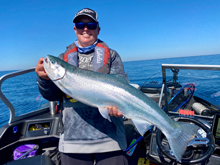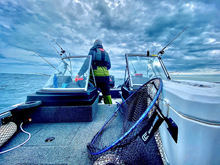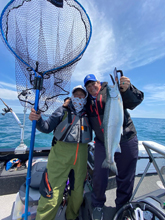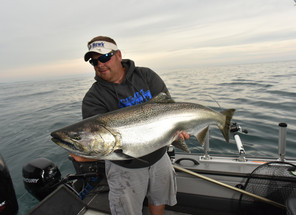Posted by Chris Larsen on 29th Jan 2021
Fishing The Great Lakes With A Small Boat
Captain Barb Carey’s passion is teaching people how to fish more effectively and break out of their comfort zone when it comes to fishing. She’s a seasoned open water and ice fishing guide. Captain Carey’s clientele is generally looking for an educational experience. She helps them learn to  catch fish and take those lessons back to their own boats.
catch fish and take those lessons back to their own boats.
We recently discussed fishing the Great Lakes with smaller boats with Carey. She fishes Lake Michigan with an open-bow fishing boat. It’s a boat that you’re just as likely to see on a local 300-acre fishing lake as you would on a big body of water. “I’m currently running a Crestliner Raptor. It’s an 1850 with a 150 horsepower Mercury motor with a MinnKota trolling motor. On this boat, I don’t even have a kicker motor. This boat has been great on Lake Michigan. I’ve learned so much in the last few years. There are many times when the small boats have the advantage.”
Those advantages are what keeps Carey running a trailerable boat on the Great Lakes. “One of the big things is fuel economy and how fast you can run. For example, if I get out there in the morning and the seas are calm and I know there’s a good offshore rainbow trout bite, I can zip out 11 miles out and use hardly any gas. I can be on those fish really quickly. The charter boats generally run a lot slower… and they’re going through a lot of fuel. So that can cut into profits. But with these small boats, I can zip out there. I can get out there quick and if the weather starts getting bad I can get in quickly. It works great.”
 Carey’s boat is small enough to cut through a lot of the waves. Bigger boats pound the waves but ultimately handle rougher seas better. But if it looks like the water is going to be really rough, she doesn’t go out. Charters using bigger boats will get more days on the water. Bigger boats also have an advantage when it comes to passenger capacity and the ability to run more lines. “They can take six passengers. Even though I’m legally allowed six passengers, it’s too crowded in a smaller boat. I like having two customers at most. But my goal is to teach them how to take their boat out. So I’m in a different realm than the charter boats. The charter boats can run more lines with those bigger boats. Some are running 12 to 14 lines. I’ll run nine lines out of my boat and not have a lot of headaches with that.”
Carey’s boat is small enough to cut through a lot of the waves. Bigger boats pound the waves but ultimately handle rougher seas better. But if it looks like the water is going to be really rough, she doesn’t go out. Charters using bigger boats will get more days on the water. Bigger boats also have an advantage when it comes to passenger capacity and the ability to run more lines. “They can take six passengers. Even though I’m legally allowed six passengers, it’s too crowded in a smaller boat. I like having two customers at most. But my goal is to teach them how to take their boat out. So I’m in a different realm than the charter boats. The charter boats can run more lines with those bigger boats. Some are running 12 to 14 lines. I’ll run nine lines out of my boat and not have a lot of headaches with that.”
With her boat being narrower than the wide beam cruisers many charters run, her rod setups are a bit different. “I run all the lines at the back of the boat. On each side, I have a three-rod holder tree that is attached to a downrigger plate that mounts to the boat. It’s really easy to take on and off. For my next rod holders, I have these Cannon dual axis rod holders which are really stiff. Those are great for running wire diver rods. Those are mounted on a permanently attached track on the gunnel of the boat and I’ll have two downriggers on both sides.”
 A lot of people believe fishing the Great Lakes is out of reach for them because they don’t have downriggers or other specialized equipment. Yes, those tools can make you more effective but Carey encourages people to be cautious but not to be afraid to fish the big water. Many serious inland trollers already have plenty of gear to get started. “One of the things people get confused about with Great Lakes fishing is they think you’re fishing in really, really deep water and we may be fishing in 300 feet of water but a lot of those lines are in the top 25 feet of the water column. Some of the best rods this spring have been with a one-ounce inline weight and a spoon. You’re running that with a planer board far away from the boat and the rainbow trout are going crazy on those.”
A lot of people believe fishing the Great Lakes is out of reach for them because they don’t have downriggers or other specialized equipment. Yes, those tools can make you more effective but Carey encourages people to be cautious but not to be afraid to fish the big water. Many serious inland trollers already have plenty of gear to get started. “One of the things people get confused about with Great Lakes fishing is they think you’re fishing in really, really deep water and we may be fishing in 300 feet of water but a lot of those lines are in the top 25 feet of the water column. Some of the best rods this spring have been with a one-ounce inline weight and a spoon. You’re running that with a planer board far away from the boat and the rainbow trout are going crazy on those.”
If you’ve always been a small water angler and thinking about hitting the Great Lakes, you will need some extra safety equipment. Check regulations before heading out. “I have a handheld marine radio. That’s really helpful. I keep that scanning to make sure there is nothing going on I need to be aware of. I have flares. One thing about flares, you buy these in a package of three or four. There is an expiration date on them and I think it’s only a couple of years out. At the beginning of the season, you have to check the dates on those flares because that is one of the things that you can get a citation for from the Coast Guard.”
You can hear our entire conversation with Captain Barb Carey by clicking the player below or visit our podcast page by clicking here.

